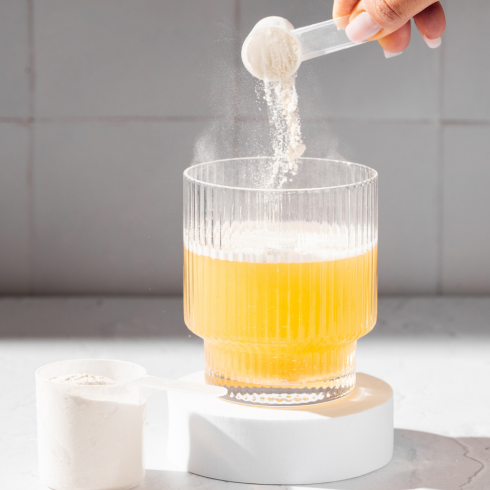Marine Collagen : Health Benefits and Usage Tips
TABLE OF CONTENTS
- What is marine collagen?
- The benefits of marine collagen
- Potential risks associated with marine collagen
- How to choose a safe marine collagen?
- Recommended daily dose of marine collagen
- How long does it take to see the effects of marine collagen?
- Best time to take marine collagen
- Marine or bovine?
- Coach’s advice
WHAT IS MARINE COLLAGEN?
Collagen is a crucial protein that ensures the proper functioning of our body. It maintains the integrity of connective tissues, skin, joints, and bones. Among the different sources of collagen available on the market, marine collagen is particularly praised for its benefits on the skin and its bioavailability. But is it really safe for health?
Marine collagen is derived from the skin, bones, and scales of fish such as cod, salmon, or trout. It is often hydrolyzed, meaning it is transformed into collagen peptides for better absorption by the body. Its structure is similar to human collagen, which gives it excellent bioavailability and quick absorption.
THE BENEFITS OF MARINE COLLAGEN
Skin Health
Collagen is a vital protein that gives the skin its firmness and elasticity. Over time, the natural production of collagen decreases, which can lead to wrinkles and sagging skin. Supplementing with marine collagen can help offset this loss. Studies have shown that taking marine collagen improves skin hydration, boosts elasticity, and reduces the depth of wrinkles. In addition, it promotes cell regeneration, contributing to smoother and firmer skin.
Joint Health
Collagen is a major component of cartilage, the tissue that protects joints. With age or repeated strain, cartilage can wear down, leading to joint pain or conditions like osteoarthritis. Supplementing with marine collagen can help maintain joint health by supporting cartilage regeneration and reducing inflammation. Research suggests that marine collagen may improve joint mobility and reduce pain associated with osteoarthritis.
Stronger Hair and Nails
The amino acids found in marine collagen, such as glycine and proline, are essential for the production of keratin, the main protein in hair and nails. Supplementing with marine collagen can therefore support hair growth, improve shine and strength, and help reinforce nails while reducing brittleness.
Digestive Health
Collagen plays a key role in the health of the intestinal lining. It helps strengthen the gut wall, which can help prevent conditions such as leaky gut syndrome. Additionally, it supports digestion by aiding in the breakdown of proteins and soothing inflammation in the gastrointestinal tract. Therefore, consuming marine collagen can contribute to better digestive health by supporting the integrity of the gut lining.
By incorporating marine collagen into your daily routine—whether through diet or supplements—you can benefit from these positive effects on the skin, joints, hair, nails, and digestive system.
POTENTIAL RISKS ASSOCIATED WITH MARINE COLLAGEN
Allergies and Intolerances
People who are allergic to fish or seafood should avoid marine collagen to prevent allergic reactions. Symptoms such as itching, skin rashes, or breathing difficulties may occur in sensitive individuals. It is therefore essential to consult a healthcare professional before starting marine collagen supplementation if you have a history of food allergies.
Heavy Metal Contamination
Depending on the origin of the fish used, traces of heavy metals such as mercury may be present in marine collagen. To minimize this risk, it is essential to choose products from controlled sources that are tested for contaminants. Opting for brands that are transparent about their production methods and the origin of their fish is recommended.
Purity and Additives
Some marine collagen supplements may contain additives, preservatives, or artificial flavors. It is advisable to choose pure products, free of additives, to avoid adverse reactions or interactions with other substances. Carefully reading labels and learning about the product’s composition is an important step before consumption.
Gastrointestinal Effects
In some individuals, excessive consumption of marine collagen may cause digestive issues such as bloating, diarrhea, or a feeling of heaviness. To avoid these inconveniences, it is recommended to start with small doses and gradually increase the amount while respecting the recommended daily dosages.
Other Precautions
- Kidney Issues: People with kidney insufficiency should consult a doctor before taking marine collagen, as excessive protein intake can put additional strain on the kidneys.
- Hypercalcemia: Marine collagen may contain calcium. Individuals with high blood calcium levels (hypercalcemia) should avoid marine collagen supplementation without medical advice.
- Pregnancy and Breastfeeding: The effects of collagen supplementation during pregnancy and breastfeeding are not well documented. It is therefore recommended to consult a healthcare professional before starting collagen supplementation during these periods.
Although marine collagen is generally considered safe, it is essential to take certain precautions to avoid adverse effects. Consulting a healthcare professional before starting supplementation—especially if you have pre-existing medical conditions—is strongly recommended.
HOW TO CHOOSE A SAFE MARINE COLLAGEN?
To ensure the safety and effectiveness of your marine collagen supplementation, it's essential to choose high-quality products. Here are some detailed tips to help you make the right selection:
Choose collagen sourced from wild-caught fish rather than farmed fish
Wild fish live in their natural environment and consume a varied diet, which can positively influence the quality of the extracted collagen. In contrast, farmed fish may be exposed to chemicals and antibiotics that can affect the purity of the final product. Opting for wild sources can therefore ensure higher quality collagen.
Ensure the product is tested for contaminants
The potential presence of heavy metals, such as mercury, in marine products is a valid concern. It's crucial to choose supplements that have undergone rigorous purity testing. Look for certifications or quality seals on the packaging, confirming the product has been tested for harmful contaminants.
Opt for hydrolyzed collagen for better absorption
Hydrolyzed collagen, also known as collagen peptides, has been broken down through a hydrolysis process into smaller protein fragments. This modification facilitates their absorption by the body, increasing the bioavailability of collagen. Supplements in hydrolyzed form are generally more effective in delivering the expected benefits.
Choose brands that are transparent about their production methods and fish sources
Transparency from manufacturers regarding raw material sourcing and production processes is a sign of trustworthiness. Prioritize brands that provide detailed information on the origin of the fish used, the extraction methods applied, and the quality control measures in place. This transparency reflects the manufacturer's commitment to product quality and safety.
By following these recommendations, you’ll be able to select a safe and effective marine collagen that suits your needs and supports your health.
Marine collagen offers numerous health benefits, particularly for the skin, joints, and digestion. However, as with any dietary supplement, it is essential to choose the right product to avoid potential risks. By opting for high-quality collagen from safe and controlled sources, you can fully enjoy its benefits without compromising your health.
RECOMMENDED DAILY DOSE OF MARINE COLLAGEN
The recommended daily dose of marine collagen depends on various factors, including health goals, age, and physical activity level. Here are some guidelines to help you determine the right amount:
General Dosage
Between 2.5 and 10 grams per day: This range is generally recommended to achieve benefits for the skin, hair, nails, and joints.
According to Health Goals
- Skin improvement: A dose of 2.5 grams per day may be sufficient to improve skin hydration and elasticity.
- Joint and bone support: A daily dose of 5 to 10 grams is recommended to maintain joint health and prevent bone loss.
- Muscle strengthening and recovery in athletes: Athletes or individuals engaged in intense physical activity may benefit from doses up to 20 grams per day to support muscle mass and promote recovery.
Additional Considerations
- Age-related adjustment: Collagen needs may increase with age due to the natural decline in collagen production in the body.
- Medical consultation: It is recommended to consult a healthcare professional before starting collagen supplementation, especially if you have pre-existing medical conditions or are taking other dietary supplements.
The daily dose of marine collagen therefore varies depending on your specific needs. It’s important to choose a dosage that aligns with your health goals and to prioritize high-quality products for optimal effectiveness.
HOW LONG DOES IT TAKE TO SEE THE EFFECTS OF MARINE COLLAGEN?
The time needed to observe the effects of marine collagen varies depending on the individual and their specific goals. However, general trends can be identified based on the benefits being targeted:
Skin Improvement
- After 4 weeks: Improved skin hydration may be noticeable.
- After 6 weeks: Fine lines around the eyes and mouth begin to fade.
- After 12 weeks: Skin elasticity improves, with a noticeable reduction in deeper wrinkles.
Hair Health
- After 4 weeks: Hair becomes softer and smoother.
- After 8 weeks: Hair appears silkier, easier to manage, and requires less conditioner.
- After 16 weeks: An increase in hair thickness can be observed.
Nail Strengthening
- After 12 weeks: Nail growth increases by 10%.
- After 24 weeks: Broken nails are reduced by 42%.
Joint Health
- After 6 weeks: A reduction in joint pain and an improvement in mobility may be noticed.
It’s important to note that these timelines are indicative and may vary depending on individual factors such as age, lifestyle, and consistency of supplementation. For optimal results, daily and regular consumption of marine collagen is recommended.
BEST TIME TO TAKE MARINE COLLAGEN
Marine collagen can be taken at any time of the day, depending on your personal preferences and daily routine. Here are some common times to consider for taking it:
In the morning, on an empty stomach
Some people choose to take marine collagen in the morning on an empty stomach, believing it allows for faster absorption. However, there is no scientific evidence confirming that taking collagen on an empty stomach improves its assimilation.
In the evening
Others prefer to consume marine collagen at night, before going to bed, due to its role in tissue repair and regeneration during sleep. However, there is no strong scientific evidence to support this practice.
Post-workout
For athletes, taking marine collagen after a workout can be beneficial for muscle recovery and joint support. This practice may help strengthen tendons and ligaments that are stressed during physical activity.
Splitting the dosage
If you consume multiple doses of marine collagen per day, it is recommended to spread them throughout the day (morning, noon, evening) to maximize absorption by the body.
In conclusion, the key is to take marine collagen regularly—regardless of the time of day—to fully benefit from its effects.
MARINE OR BOVINE?
Collagen is an essential protein found in our body, particularly in the skin, bones, and joints. The two main sources of collagen used in supplements are marine collagen and bovine collagen, each with its own characteristics.
Origin:
- Marine collagen: Extracted from fish by-products such as the skin, scales, and bones of fish like salmon, tuna, or cod.
- Bovine collagen: Derived from collagen-rich tissues of cattle, including skin, bones, and tendons.
Types of Collagen:
- Marine collagen: Mainly composed of type I collagen, beneficial for skin, hair, and nails.
- Bovine collagen: Primarily contains types I and III, making it ideal for skin, bone, and joint health.
Bioavailability and Absorption:
Marine collagen is often considered to have better bioavailability due to its smaller peptide size, which facilitates more effective absorption by the body.
Taste and Smell:
- Marine collagen: May have a strong marine taste and smell.
- Bovine collagen: Generally neutral in taste and odor.
Origin and Composition:
- Marine collagen: Sourced from fish skin, bones, and scales, mainly composed of type I collagen, essential for the health of skin, bones, and tendons.
- Bovine collagen: Extracted from cattle skin, bones, and tendons, it primarily contains types I and III, beneficial for skin, bones, and joints.
Allergies and Dietary Restrictions:
- Marine collagen: Should be avoided by individuals allergic to fish or seafood.
- Bovine collagen: Not suitable for vegetarians or vegans but ideal for those avoiding marine products.
Environmental Impact:
Marine collagen production generally has a lower carbon footprint than bovine collagen, as it utilizes by-products from the fishing industry.
Price:
Bovine collagen is often more affordable than marine collagen due to lower production costs.
If your priority is optimal absorption and you have no seafood allergies, marine collagen can be an excellent option. On the other hand, if you're looking for a more affordable alternative and have no dietary restrictions regarding bovine products, bovine collagen may be suitable. In any case, it's essential to choose a high-quality product from reliable sources to maximize the health benefits of collagen.
The choice between marine and bovine collagen depends on your specific needs, dietary preferences, and sensitivity to allergens. Selecting a quality product from trustworthy sources is key to making the most of collagen’s health benefits.
COACH'S TIPS

With the growing popularity of collagen, many brands now offer a variety of products. It’s essential to carefully check their composition and remain realistic about the expected results, as no supplement can replace a balanced diet and regular physical activity.
Look for certifications such as GMP, ISO 9001, ISO 22000, NSF International, HACCP, or Halal. At QNT, we place great importance on the manufacturing quality and the ingredients we use.
Collagen is very trendy, especially on social media, and many fitness enthusiasts appreciate its benefits. If you’re experiencing joint, skin, or tendon issues, a collagen course over a few months could be beneficial for you.
Related posts
-
 Summer holidays: How to limit the damage?
Posted in: Our tips24/06/2021On holiday, we often tend to let ourselves go. Unless you're a hardcore sportsman, you tend to abandon your trainers...Read more
Summer holidays: How to limit the damage?
Posted in: Our tips24/06/2021On holiday, we often tend to let ourselves go. Unless you're a hardcore sportsman, you tend to abandon your trainers...Read more -
 Which fat burner to choose?
Posted in: Our tips26/05/2021To lose weight and burn fat, there is no secret: you have to do sport and take care of your diet. However, it is...Read more
Which fat burner to choose?
Posted in: Our tips26/05/2021To lose weight and burn fat, there is no secret: you have to do sport and take care of your diet. However, it is...Read more -
 Summer body edition for men: How to prepare your body?
Posted in: Our tips11/05/2021Gentlemen ? The return of the sun and its warm rays are almost here! The degrees are slowly but surely rising, but...Read more
Summer body edition for men: How to prepare your body?
Posted in: Our tips11/05/2021Gentlemen ? The return of the sun and its warm rays are almost here! The degrees are slowly but surely rising, but...Read more -
 9 good reasons to do sport.
Posted in: Our tips22/04/2021Sometimes the urge to exercise is not always there. And although we always tell ourselves that this year will finally...Read more
9 good reasons to do sport.
Posted in: Our tips22/04/2021Sometimes the urge to exercise is not always there. And although we always tell ourselves that this year will finally...Read more -
 Discover how to take care of your faithful companion: your shaker!
Posted in: Our tips07/04/2021In your bag, in your hand, in your sink, it is everywhere! The shaker is an essential element of any good training....Read more
Discover how to take care of your faithful companion: your shaker!
Posted in: Our tips07/04/2021In your bag, in your hand, in your sink, it is everywhere! The shaker is an essential element of any good training....Read more
Blog categories
Popular posts
-
 Looking thinner but at a heavier weight? Is that possible?04/10/2021Posted in: Our tipsAdvertising has shaped our thinking! We have been forced for years to believe that losing weight is the key to having...Read more
Looking thinner but at a heavier weight? Is that possible?04/10/2021Posted in: Our tipsAdvertising has shaped our thinking! We have been forced for years to believe that losing weight is the key to having...Read more -
 Proteins for weight loss !29/12/2023Posted in: Our tipsDive into the fascinating world of proteins and their key role in weight loss. Discover how to choose the best...Read more
Proteins for weight loss !29/12/2023Posted in: Our tipsDive into the fascinating world of proteins and their key role in weight loss. Discover how to choose the best...Read more -
 10 BENEFITS OF GLUTAMINE.02/01/2024Posted in: Our tipsDiscover the power of L-glutamine, an underrated superhero in the world of amino acids! Essential for revitalizing...Read more
10 BENEFITS OF GLUTAMINE.02/01/2024Posted in: Our tipsDiscover the power of L-glutamine, an underrated superhero in the world of amino acids! Essential for revitalizing...Read more -
 Which foods boost testosterone levels ?07/05/2021Posted in: Food supplementsTestosterone, often associated with virility, has much more to offer than you might think. It plays a crucial role in...Read more
Which foods boost testosterone levels ?07/05/2021Posted in: Food supplementsTestosterone, often associated with virility, has much more to offer than you might think. It plays a crucial role in...Read more -
 Is there a link between sex and sport?14/11/2019Posted in: LifestyleMany have already asked questions about sex and sport. Most of the time, people want to be reassured by the many...Read more
Is there a link between sex and sport?14/11/2019Posted in: LifestyleMany have already asked questions about sex and sport. Most of the time, people want to be reassured by the many...Read more

.jpg)

